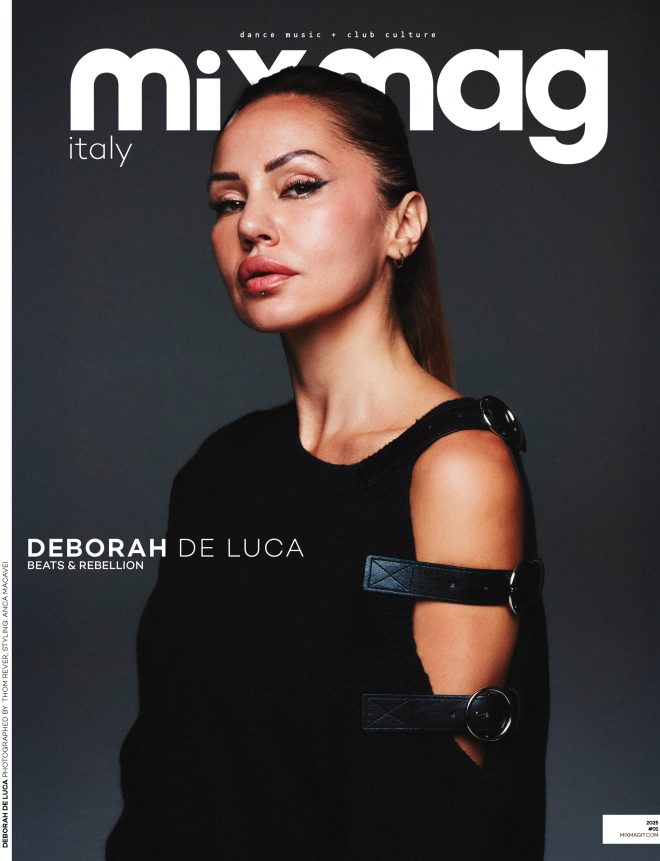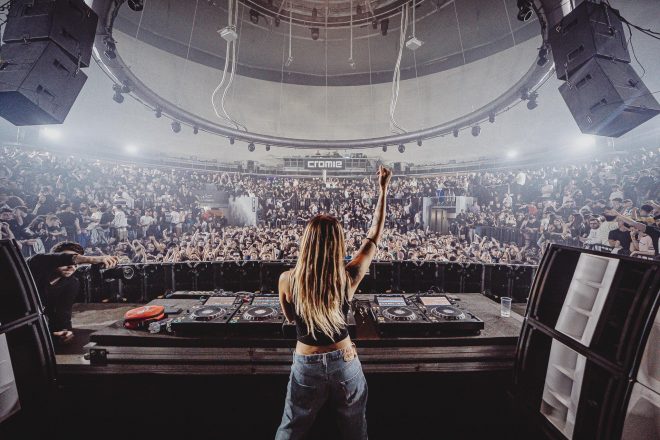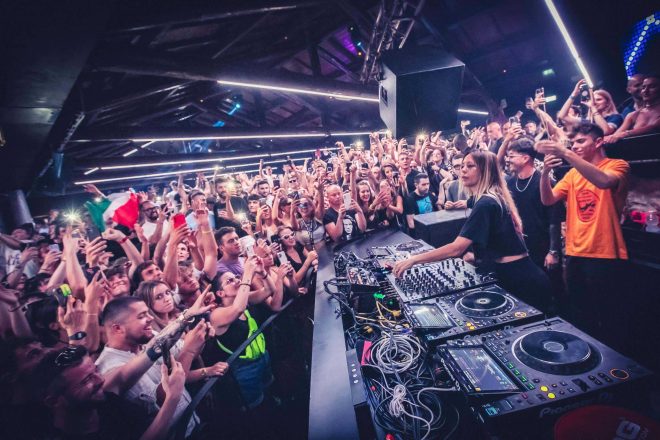DEBORAH DE LUCA | IT 2025 #01
Beats & rebellion

If you want to understand the real undercurrent of techno today, forget the algorithms, the TikToks, the sticker-slap activism. Look instead at Deborah De Luca — a woman who carved her path from the concrete blocks of Scampia to Times Square, Ibiza, and beyond. She doesn’t just play techno; she embodies all the rage, the grace, the contradiction, and redemption that make this music matter nowadays.
In a world where visibility often masquerades as progress, De Luca slices through the noise with a voice sharpened by experience. She’s seen it all: the backroom machismo of the early 2000s, the tokenism masked as inclusion, the fake smiles at the VIP bar. And yet, she’s never played the victim. She plays the long game — remixing Dirty Dancing and Blondie with the same unapologetic flair she brings to calling out sexism in the booth. Her latest albums, Hard Pop and Hard Pop Vol. 2, aren’t just club weapons, they’re manifestos against purism, proof that you can be both romantic and ruthless on a dancefloor.
We caught up with Deborah at a moment of sharp reflection, we talked about the pressures of digital culture, the disappearing sanctity of the dancefloor, and the weight of being a woman in a scene still haunted by old ghosts. What emerged wasn’t just another DJ interview, but a blistering, unfiltered look into the life of an artist who refuses to play by anyone’s rules but her own.
Because when De Luca steps behind the decks, she doesn’t just move the crowd — she dismantles the cage. With heartbreak or horsepower, she reclaims space not just for herself, but for every outsider who was told they didn’t belong.
This is not your standard feature. This is Deborah De Luca — raw, relentless, and still rising.
AGAINST THE LOCKED DOOR
Deborah didn´t ask for a seat at the table — she built her own, nailed it to the floor, and dared the boys to sit down. She’s gone from local legend to global powerhouse without ever softening the edges. And yet, while the headlines often focus on her rise, what gets lost is the war she fought on the way up — a war against the slick, smiling, “we’re inclusive now” lie that still lingers in the shadows of electronic music.
So we asked her straight: how real is the machismo in techno? Is it just as bad now, only better disguised?
“Machismo or male chauvinism or sexism? Yes, absolutely. In this industry, it is very seriously present,” she says, without missing a beat.
“As for my experience, from the beginning, at the start, it was much more evident. Now, with this phenomenon of female DJs being more present, let’s say they’ve opened a small door by letting a few of us through, especially in recent years, a bit more. But when I started, it was completely an exclusive boys’ club. We were like cameos, like the cherry on top of the cake, but not part of the actual mix of ingredients in the cake.”
That’s a metaphor that lands like a steel-toed boot on a dancefloor still slick with industry hypocrisy. She’s not romanticizing the past, nor pretending the present is post-sexist. Deborah is clear: the techno world didn’t open up — she broke in.
“Yes, we were seen as, let’s say, not professional — because if you were a woman, if you were pretty — goodbye. A pretty woman couldn’t possibly also be good. So fundamentally, we were labeled like dolls,” she continues.
“Now, it’s different. Now that we’ve conquered a good slice of the market, things have changed. Still, appearance is always a point of contention that brings out sexism and machismo; In the case of a pretty girl, it comes out even more.”
It’s rare to hear this kind of honesty from someone who’s made it. Many shy away from burning bridges once they’ve crossed them. Not De Luca. She scorches them.
But she’s not just pointing fingers, she’s dissecting the structure. When we ask if the female experience in electronic music produces a different artistic DNA — some kind of resistance, emotion, or sonic reclamation, her answer is brutally nuanced.
“Well, we are very competitive (women)”, she adds, “which adds to the culture of machismo. They (men) can form groups and be friends, while we more often than not are at odds with each other and in constant competition. This, I´m sure, is a reflection of the sexism instituted in the industry.”
She pauses, not to soften the blow, but to drive it deeper.
But in the past, it was really… it was like a closed door. If you were a pretty woman, it was a huge closed door — triple locked.”
“Triple locked, that’s the phrase that sticks. That’s the core of De Luca’s and of so many women who came up during a time when beauty was a curse, talent was dismissed, and being both meant you were unbookable.
Now? Now she sells out shows on multiple continents, helms her label Sola_mente Records, and headlines festivals where some of those old gatekeepers now open for her. But make no mistake — she hasn’t forgotten what it took to get here. And she has no patience for the new sanitized stories that pretend the struggle is over just because there’s more lipstick on the line-up.
Deborah De Luca still plays like she has something to prove — not to the world, but to the girl she was, pounding on that triple-locked door. And when she drops a track, whether it’s Hard Pop, hard techno, or hard truth, she isn’t just making people dance.


LOVE SONGS IN STEEL-TOED BOOTS
Deborah De Luca doesn’t just play techno — she wages psychological warfare on the dancefloor. Her music pulses with contradiction: a collision of romance and rage, silk and concrete, euphoria and defiance. For over a decade, she’s built a sound that doesn’t ask for approval from the purists or the mainstream — it eats them both alive.
So where does that tension come from? We asked her if the emotional polarity in her music — the rawness, the elegance, the bite — is born from the dualities in her own identity.
“I don’t know how being a woman has influenced things, because I’ve never been a man, so I can’t say,” she shrugs, unapologetically.
“What I can tell you is what has influenced the music I make: a big influence was the music my father used to play for me when I was a child — all the vinyls he bought and collected, and that he played for me from when I was three or four years old. It was pop music from the ’70s, ’80s, and ’90s, Italian and international. That had a big impact.”
That DNA of nostalgia — of Italo-pop, disco melodrama, and cinematic heartbreak — didn’t get lost when she walked into the warehouse. It mutated. It grew darker. It learned to punch.
“Then, the feminine touch — well, yes,” she admits, cautiously.
“For example, I did a remix of La Consola from Dirty Dancing, and that one is feminine. So maybe in that sense — in the choice of certain things to reinterpret, or certain melodies that are perhaps a bit more… yes, maybe a bit more feminine — yes.”
But don’t call it soft. Her latest works, Hard Pop and Hard Pop Vol. 2, sound like a steel refinery caught in a thunderstorm — but laced with hooks that wouldn’t be out of place in a power ballad. It’s techno that seduces before it slaps. A deliberate refusal to choose between the rave and the radio.
So is this bold genre collision an artistic rebellion? A statement against the calcified, gate-kept version of techno some still cling to?
“So, to what extent? Yes, my music probably also reflects my various personalities — because, without having any particular mental health issues, I believe we all have different sides: the person who goes to work, the person who’s at home, the person with our life partner, the person with our dogs. We all have different ways of being.”
And on stage?
“As for me—yes — during my sets, I’m both that quite strong techno persona and the melody that grabs you in a moment when you least expect it,” she says.
“Like a remix of a track you’d never see coming — like Heart of Glass by Blondie, or the remix I mentioned earlier from Dirty Dancing.”
It’s in those unexpected drops — that jarring switch from brutalist percussion to a melodic loop that rips your chest open — that De Luca does her most dangerous work. Because the edge she dances on isn’t just musical; it’s emotional. It’s about letting vulnerability exist in a space that worships hardness.
“Even in my last two albums (Volume One and Volume Two), I have songs that I’ve turned into techno tracks,” she says.
“And that’s where my romantic side comes out — the side I usually deny I have, but that runs deep inside me, as it does in most women. That innate desire to live through certain experiences of love, of emotion.”
This is what makes Deborah De Luca impossible to imitate: she doesn’t just build tracks, she bleeds into them. Her identity isn’t a marketing asset — it’s the voltage inside every synth stab, every kick, every unpredictable drop. She doesn’t hide her contradictions — she weaponizes them.
And whether she’s remixing pop nostalgia into warehouse warfare or turning heartbreak into a bassline, one thing is clear:
Deborah De Luca is not here to play a part; she’s here to tear the narrative to shreds — and write her own, in full volume.
VINYL, USBs & A MIDDLE FINGER TO THE RULEBOOK
The techno world has changed. It used to be sweat and vinyl and underground flyers. Now, it’s USB sticks and Instagram algorithms, and if you want to survive, you don’t just have to mix tracks. You have to brand yourself.
But Deborah does not follow that script. She tears it up. When we asked her how she feels about the digital transformation of the DJ world — from vinyl crates to beat-matched BPM grids and curated Spotify aesthetics — she didn’t flinch.
“Yes, in fact, it’s a kind of rebellion — but really, everything I’ve done from the beginning has been about rebelling against the rules,” she says.
“Against these dogmas that are imposed — I don’t even know by whom — that tell you which path you have to follow to be a techno artist, a tech house artist, a pop artist.”
De Luca’s defiance isn’t posturing — it’s the foundation of her entire career. From playing small clubs with a shoulder-breaking bag of vinyls, to headlining global stages with a USB in hand, she’s navigated the scene without bowing to its unwritten commandments.
“With my music, with my career in general, but especially with my latest album, I wanted to dismantle those dogmas, even if just temporarily,” she says.
“You can always go back to ‘normal’ or to the rules someone decided should exist in this world. But yes, it’s a part of who I am — this need to always go against the rules.”
In an industry that constantly tells artists to stay in their lane, De Luca builds her freeway.
“I want to show that it’s possible to live by another kind of rules. That there are always two or more paths.”
“Yes, I always try — sometimes even intentionally — to shock. I like to provoke, to disturb people, to make them feel uncomfortable. But sometimes that discomfort can make them think, can help open their minds to other possibilities.”
It’s not just the music that’s changed — it’s the culture around it. Social media brought unprecedented visibility, but at a cost: overexposure, pressure, and the slow erosion of mystery. In a world where presence is currency, how does someone like De Luca protect what’s sacred?
“I started when vinyl was still the standard,” she recalls.
“And I remember — those who came to my early gigs know this — I used to travel with this big bag. At the time, I was making very little money, so I flew with Ryanair when they only allowed one piece of luggage. I had this bag that I carried on my shoulder — in fact, my shoulder was always in pain — and I’d bring around 20 vinyl records with me. With those, I would do a 90-minute set.”
Now, things are different. Lighter. Faster. Wider. Some say something’s been lost in the transition to USBs — but De Luca sees possibility.
“Some people think that with digital, with USBs, something has been lost. But in my opinion, it has opened up possibilities: a DJ can now explore hundreds of thousands of genres.”
“When I started 16 years ago, I was buying vinyl, and those who used CDs back then actually had more music than I — more new releases. That’s why, eventually, I gave in too and started using CDs, maybe a year later, because I was always the last to get the newest tracks. There just weren’t many vinyl releases each week.
“With CDs and now with digital music and USBs, there’s so much variety. You can carry thousands upon thousands of songs and tracks with you. I think, on one hand, it’s an evolution.”
But with evolution comes the noise…
“Though on the other hand, I still get people under my posts or videos, mocking me,” she admits.
“The haters-those — famous haters — who don’t have a happy life, so they try to ruin other people’s. They attack me for using USBs, as if everyone else were using violins or harpsichords.”
She laughs. Because she knows better.
“In reality, it’s just the evolution of the DJ world — yes.”

REBELLION & REDEMPTION
From the streets of Scampia to the lights of Times Square, Deborah De Luca has carved a path that defies genre, gender, and geographic limitation. Her career isn’t just a rise to the top—it’s a continuous act of rebellion, reinvention, and resistance against a system that often tries to box in creativity.
When asked about the massive shift from analog beginnings to algorithmic playlists, De Luca doesn’t hesitate to confront the purist nostalgia surrounding DJ culture.
“Yes, in fact, it’s a kind of rebellion — but really, everything I’ve done from the beginning has been about rebelling against the rules, against these dogmas that are imposed — I don’t even know by whom — that tell you which path you have to follow to be a techno artist, a tech house artist, a pop artist.”
Her latest album, she explains, is a direct challenge to those constructs.
“With my music, with my career in general, but especially with my latest album, I wanted to dismantle those dogmas, even if just temporarily. You can always go back to ‘normal’ or to the rules someone decided should exist in this world. But yes, it’s a part of who I am — this need to always go against the rules.”
“I want to show that it’s possible to live by another kind of rules. That there are always two or more paths. Yes, I always try — sometimes even intentionally — to shock. I like to provoke, to disturb people, to make them feel uncomfortable. But sometimes that discomfort can make them think, can help open their minds to other possibilities.”
While social media has helped democratize visibility, it’s also turned presence into a metric. For De Luca, the pressure to constantly be seen weighs heavily.
“If you go even a week without posting anything, it’s as if your career is about to end… But from the outside, people don’t see you, you’re not present.”
She contrasts this with artists like Ricardo Villalobos.
“Some DJs are legends in this world… who never post anything, nothing at all. And from the outside, the new generation sees that as a shortcoming, as if he’s no longer relevant. But in reality, I believe he’s made a very intelligent choice for himself — the choice not to chase likes, comments, stories, or Reels.”
“My job requires me to be very present. And I would like to learn to be present for myself — without constantly looking at what others are doing, without being in constant competition, without feeling like you always have to do something, and that whatever you do, it has to be better than before.”
Her warning is clear.
“I think it leads to burnout, to a psychological crisis. You have to be very careful with these things — truly very careful.”
Hailing from a neighborhood too often reduced to crime headlines and cinematic clichés, De Luca’s story is one of unrelenting forward motion. Her career is a living argument against geographic and socio-economic determinism.
“I believe that my entire career is an act of redemption — a way of showing that despite coming from a place that swallows you, chews you up, and spits you out — like Scampia… everything I do is a form of redemption.”
Playing Times Square was more than a milestone.
“Playing in Times Square as the only female DJ and the second Italian ever after Måneskin — that was redemption. The remix with Nelly Furtado — that too was redemption. Fundamentally, everything I do is about reclaiming something.”
“I like to shine a bit of light on those kids who may believe that only people born in Milan, Rome, or New York have opportunities. But the truth is, it just takes a bit more strength, a bit more character. But yes, you can make it. You can escape the stigma of certain places.”

THE DANCEFLOOR AS RESISTANCE
In an era where club culture often risks commodification, De Luca still sees techno’s potential as a political act—but only if systems allow it.
“It’s sad, but I don’t see this happening in Italy — especially not in Italy. I see the opposite. I don’t see the government getting close to this world and trying to work alongside it to create safe spaces.”
“If something happens, like a young person feeling unwell inside a club — even if they arrived drunk or took something before getting there — without even investigating, they shut the place down.”
She reminds us that clubs are not just hedonistic playgrounds.
“A venue isn’t just a place where people go to have fun. A venue is a place where hundreds of families work, earn a living, and move forward with their lives.”
Despite criticism from analog loyalists, De Luca believes embracing change is part of the journey, not a betrayal of it.
“Some people think that with digital, with USBs, something has been lost. But in my opinion, it has opened up possibilities: a DJ can now explore hundreds of thousands of genres.”
She laughs off the gatekeeping.
“The haters-those — famous haters — who don’t have a happy life, so they try to ruin other people’s… They attack me for using USBs, as if everyone else were using violins or harpsichords. In reality, it’s just the evolution of the DJ world.
Looking ahead, De Luca offers rare spiritual clarity about what truly matters for the next wave of female DJs—not fame, not virality, but identity.
“For me, one of the most important things a DJ must have — even if maybe you don’t like my genre — is that when you listen to my set, you know it’s mine. You’re not wondering if it’s someone else’s.”
Signature over style. Authorship over trend. That’s her gospel.
“What’s important in this world is having your signature, being recognizable, because there are so many of us, and a lot of people are doing the same genre.”
Unlike many selectors, De Luca’s sets are almost entirely her productions.
“95% of my set is made up of my tracks… That’s why when I play for four hours, I might only include three or four tracks that aren’t mine.”
It’s a relentless creative cycle, driven by the need for authenticity.
“In the last 12 months, I’ve made around 70 tracks. About 50 of them are split between Hardpop Vol. 1 and Vol. 2, and the rest are edits or versions I can’t publish due to licensing. I make those just to play out, because I need people who come to my sets to listen to me, not just my selection of someone else’s tracks.”
MY THOUGHTS
Deborah De Luca is the kind of artist who doesn’t just play music—she throws her entire life story into the crowd and dares them to feel it. There’s a raw, audacious beauty in how she’s built her career without playing by the rules, without asking for permission, and certainly without compromising. In an industry that often rewards polish over passion, De Luca shows up with grit under her fingernails and power in her presence. She’s not just a DJ, she’s a walking act of resistance.
What strikes me the most about De Luca is her unapologetic need to be heard, not just played. The fact that her sets are 95% her productions is not just a flex—it’s a manifesto. She doesn’t want to “curate” other people’s greatness; she wants to confront you with her own. That’s radical in today’s copy-and-paste culture, where virality often trumps voice. De Luca’s approach is sacred: if you’re on her dance floor, you’re in her world. And that world is built from the ground up; literally.
There’s something deeply spiritual about how she views identity. Not as something to be branded, but as something to be protected, sharpened, and made unmistakable. She speaks about her origins—Scampia—not with shame or nostalgia, but with a warrior’s clarity. Every show, every remix, every boundary pushed is an act of redemption. It’s not about fame. It’s about writing over the narrative that society tried to assign to her.
She understands the dance floor not just as a space for release, but as a battleground. In Italy, where club culture still struggles for legitimacy, she’s fighting not just for the music but for the right to have music at all. For the communities built around these spaces. For the misunderstood magic of nightlife. And she’s doing it with the kind of fire that can’t be taught—it has to be earned, lived, and survived.
De Luca doesn’t hide behind minimalism or mystique—she faces you head-on with provocation. And that’s refreshing. While some artists meditate in ambiguity, she prefers confrontation. Her sets aren’t just journeys; they’re statements. You’re not meant to relax—you’re meant to wake the fuck up. To her, discomfort is a tool. A crack in the listener’s armor. A way in.
In the end, what Deborah De Luca offers isn’t just music—it’s a blueprint for resilience. For women, for outsiders, for anyone who’s ever been underestimated. She’s the proof that you can break the rules, bend the genre, burn the algorithm, and still win. And she does it all while keeping her name, her sound, and her soul intact. That’s not just inspiring—it’s revolutionary.


